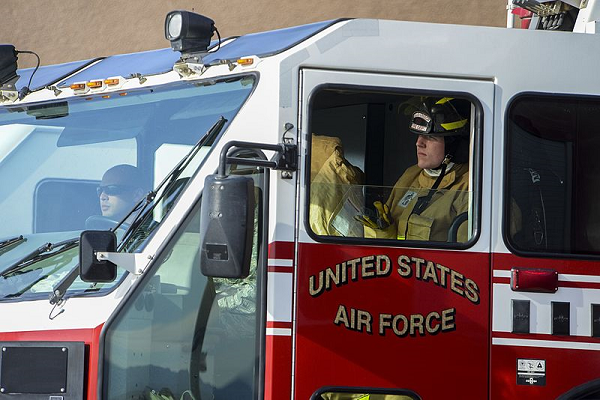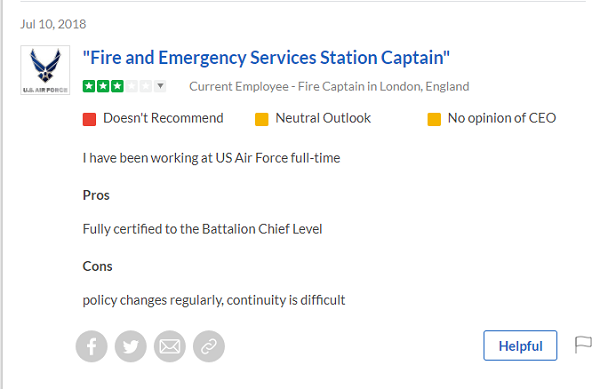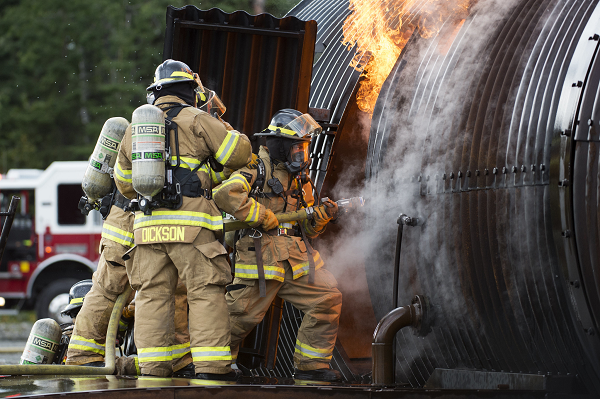Air Force Fire Protection is similar to a civilian fire fighter position.
An individual in the Air Force Fire Protection position would fight fires and protect people and property during a fire or natural disaster.
Airman may be putting out something as small as a brush fire or as large as a forest fire from a natural disaster.
In addition to fires that may happen from natural disasters, Fire Protection Specialist will also put out fires that could be from hazardous materials and rocket fuel.
Because of this possibility, they will be receive nationally recognized hazardous materials training.
They will administer first aid, provide prevention information, operate special fire equipment and conduct search and rescue missions.
The Fire Protection Specialist will also help out with civilian fire departments when needed.
Some duties that might be less-known is the duty of Fire Protection Specialist to manage fire alarm communication centers, complete fire extinguisher inspections, and complete inspections on equipment, vehicles and clothing.
Airmen can also analyze trends and complete guidance and corrective actions on planning and prevention.
Related Article – Air Force Jobs List: A List Of All AFSC’s In The Air Force
Requirements and Qualifications
To become a Fire Protection Specialist you must have a High School Diploma or GED and be between the ages of 17 and 39.
ASVAB requirements are to get at least a 38 in the general Air Force requirement area.
Other requirements and qualifications include:
- Ability to speak distinctly
- Driver’s License and ability to operate government vehicles
- No record of colorblindness, pyrophobia, acrophobia or claustrophobia
- Knowledge of fire department mission
- Meet National Fire Protection Association Physical Standards
- 8.5 weeks Basic Military Training
- Complete a credit check
- Complete national and local agency check
Training and Education

You will begin with the required 8.5 weeks of Basic Military Training.
Related Article – How Hard Is Air Force Basic Training?
After Basic Military Training, airmen have 68 days of technical training at Goodfellow Air Force Base in Texas.
During this technical training, recruits will gain experience using specialized firefighting equipment and tools, extinguishing fires and performing rescue/first aid procedures.
Individuals in technical training will learn safety objectives and communication to properly fight fires in all situations.
They will also learn how to properly handle hazardous materials, different methods of fire entry, and any other aspect related to effective fire fighting.
The training at Goodfellow Air Force Base is one of the highest-ranked and used training facility.
The training facility is used by all branches of the Military.
The instructors have also attended the school and can share their real-world experiences with students.
How much does an Air Force Fire Protection Individual Make?
Every airman is paid equally based on their rank and years of service.
This gives you a great opportunity to advance.
You can find the beginning pay table for the Air Force below:
| Insignia | Pay Grade | Rank | Abbreviation | 2023 Minimum Monthly Pay |
|---|---|---|---|---|
| E-1 +4 months | Airman Basic | AB | $1,917.60 | |
| E-2 | Airman | Amn | $2,149.20 | |
| E-3 | Airman First Class | A1C | $2,259.90 | |
| E-4 | Senior Airman | SrA | $2,503.50 | |
| E-5 | Staff Sergeant | SSgt | $2,730.30 | |
| E-6 | Technical Sergeant | TSgt | $2,980.50 | |
| E-7 | Master Sergeant | MSgt | $3,445.80 | |
| E-8 | Senior Master Sergeant | SMSgt | $4,957.20 | |
| E-9 | Chief Master Sergeant | CMSgt | $6,055.50 | |
| E-9 | Command Chief Master Sergeant | CCM | $6,055.50 | |
| E-9 | Chief Master Sergeant Of The Air Force | CMSAF | $6,055.50 |
In addition to the pay table above, Airman receive other benefits.
One of those benefits is very low cost health benefits, paid sick time and 30 days paid vacation.
If you live on base your living expenses are covered including housing and utilities.
Bases often have many recreational areas as a bonus benefit.
If you choose to live off base, you will receive a monthly tax-free housing allowance that is based on your rank and service time.
Other benefits include retirement and the ability to receive college credit.
Gaining college credit begins at the beginning of training.
You can receive low cost college tuition or receive 100% covered tuition with one of the many college tuition assistance programs that are offered to Air Force and Military members.
Some of the college tuition assistance programs include:
- Air Force Tuition Assistance Program
- Post 9/11 GI Bill
- Montgomery Bill
What is being a Fire Protection Specialist like?
Going through initial training is not easy.
Learning the skills covers both in the classroom comprehensive training and hands on training.
View the video below for reviews from Air Force Airman during training.
After you complete training there are still many opportunities to learn new regulations and policies in different areas.
When looking through reviews of a Fire Protection Specialist, or similar position in the Air Force, most people say that the position is very rewarding and that they have gained valuable skills.
As you can see from the Glassdoor review below, the job is rewarding but there are regulations that change constantly that you must be aware of.
Related Article: Air Force Ranks And Pay
The constant change made the individual not recommend the position and this is a common issue in other reviews of the position.
But, going in with the knowledge that this is part of the job, will help you be prepared for the change and constant education.
Being fully aware of what the position requires once you complete the basic training will help you be successful in any position.

The day to day duties of a Fire Protection Specialist may change dramatically depending on emergency situations.
Your day could be very similar to the one before or you could be presented with a situation that you have never been a part of.
As a Fire Protection specialist there are periods of time where you could be away from home for up to a couple months, depending on the needs of the fire, but can generally expect a normal work day when there are not emergency or high demand situations.
It is important to consider that you are also put in the situation of dealing with hazardous chemicals and fuels.
The Air Force allows for opportunities for growth and as you become an officer, the pay range increases dramatically.
Civilian Career Opportunities
Becoming a Fire Protection Specialist allows you to gain useful prevention, tracking and fire fighting techniques.
The most obvious civilian career opportunity is the ability to join as a fire fighter for a city or county.
Generally they are very open to hiring airmen and welcome the experience.
A career in emergency management can also be relevant because as a Fire Protection Specialist you will gain tracking and prevention skills that are imperative in emergency management.
Because of the first aid training that is required by Fire Protection Specialist, the knowledge and experience gained will be directly applicable to EMT positions as well.
References:
U.S. Air Force Fire Protection
- 5 Worst Jobs in the Air Force - June 20, 2024
- 4 Steps For Visiting An Air Force Recruiter Near You - June 19, 2024
- Air Force Safety Specialist (1S0X1) - June 19, 2024

